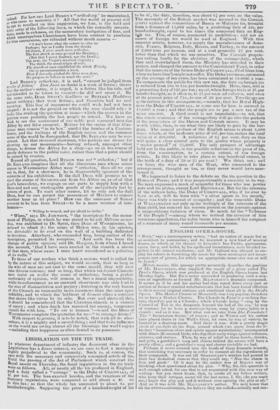LEGISLATION ON THE TIN TRADE.
IN whatever department of industry the dominant class in the Legislature has a direct interest, we are sure to find a monopoly highly prejudicial to the community. Such is, of course, the case with the necessary and extensively consumed article of tin. Until the passing of the Act of Parliament which received the Royal assent on Thursday, the fiscal regulations in the tin trade were as follows. All, or nearly all the tin produced in England, Paid a duty called a "coinage" to the Duke of CORNWALL, of V. per ton. The fees exacted besides, and the vexations of the Stannary regulations, were computes! to add about a 14. are to this tax ; so that the whole tax amounted to about 6s. per hundredweight. Supposing the price of a hundredweight of tin to be 41., the duty, therefore, was about 641 per cent. on the value. The monopoly of the British market was secured to the Cornish gentry against the competition of Banca or Malayan tin, brought from a distance of 15,000 miles, by a protecting duty of 508. per hundredweight, equal to ten times the computed duty on Eng- lish tin. This, of course, amounted to prohibition ; and not an ounce of foreign tin would be used in England. With this superior article, however, we supply the manufacturers of Ame- rica, France, Belgium, Italy, Russia, and Turkey, to the amount of 2,000 tons per annum, and at a cost generally 23 per cent. lower than that which we use ourselves. The Cornish proprie- tors calling loudly for the abolition of the coinage-duty, which they said overwhelmed them, the Ministry has attended to their prayer, and charged the amount to the Consolidated Fund, in order that the interests of the future Duke of CORNWALL, (God bless him, when we have him !) might not suffer. The Duke's revenue, estimated on the average of ten years, has been calculated at 19,0001. a year. To compensate the public for this new tax, the duty on foreign tin is reduced from 50s. to 15s. per hundredweight. Here, then, still is a protecting duty of 151. per ton ; equal, when foreign tin is at 31. per hundredweight, as it often is, to 23 per cent. ad valorem, and even at its present price of 75v., to one of 20 per cent. Two things are quite certain in this arrangement,—namely, that his Royal High- ness the Duke of CORNWALL, or some one for him. is secured in 19,0001. a year ; and that the people are to pay a new tax of the sante amount. A third result is not improbable,—to wit, that the whole remission of the coinage-duty will go into the pockets of the proprietors of the Devon and Cornish mines. It may be worth while, then, to see what they are likely to gain by the bar- gain. The annual produce of the English mines is about 5,000- tons; which, at the moderate price of SO/. per ton, makes the total value of it 400,0001. A reduction of 61 per cent. duty on this will make a clear annual gain to the gentry whose property is " under ground" of 25,0001, The only prospect of advantage held out to the public, is the possible reduction in the price of tin, from the consumption, to a certain extent, of the foreign article. Is this likely to take place to any beneficial extent, in the teeth of a duty of 20 or 25 per cent ? We think not ; and we fancy the wise men of the West, who consented to the arrangement, thought so too, or they never would have sanc- tioned it.
We happened to listen to the debate on the tin question in the House of Peers; and it was unquestionably a curiosity in its way. No man expressed a mark of sympathy for those who use pewter
pots and tin plates, except Lord BROUGHAM. But for the interests of the unborn babe, the Duke of CORNWALL, who, if he ever be born at all, will be born with " a silver spoon in his mouth," there was truly a torrent of sympathy ; and the venerable Duke of WELLINGTON not only spoke feelingly of the interests of the
dear child, but entered his solemn protest on the journals against a supposititious violation of them. So much for the "Tribunes of the People!"—among whom we noticed the inventor of this veracious appellation, the noble baron who is himself the recipient of a sinecure of many round thousands per annum.


























 Previous page
Previous page